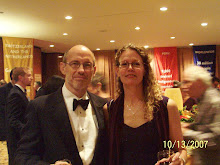Here are some reasons the Nobel Peace Prize didn’t go to
the Organization for the Prohibition of Nuclear Weapons.
First, many people believe that the existence
of nuclear weapons actually saved lives by ending World War II sooner and then
later preventing war between the US and the former Soviet Union. Today nuclear weapons could arguably be said
to be useful in protecting Israel, South Korea and preventing a serious war
between the US and China if hostilities break out over some escalation of
violence over some territorial dispute with one of our sworn allies Taiwan or
Japan. It’s fair to reason that the second
Iraq war would have never happened if Saddam would have had nuclear
weapons.
Second, there is the remote possibility
that nuclear weapons could be useful in protecting humanity from celestial threats
such as asteroids or some other non-earthly force.
Third, the possession of nuclear
weapons is extremely expensive and complicated.
Few in the world retain them, fewer still want to make them, and any actual
imposed ban on making them could start another war (See Iraq and Iran).
Fourth, while hypothetically it is technologically
feasible to detect a violation of a ban on nuclear weapons (which radiate a unique
and potentially detectible signal -- unlike chemical or biological weapons) any
attempt to verify a ban would be prohibitively expensive and physically
intrusive in nations that may not want, or allow such inspections. This would inevitably result in a
deterioration of almost any ‘trust but verify’ schemes.
Fifth, we have not witnessed the
effects of a nuclear weapon in over 5 decades.
The recent use of chemical weapons and the increasingly likelihood that
more such incidences (state or rebel/terrorist sponsored) has many people in
high or knowledgeable places very concerned, puts this potential WMD high on
humanities ‘security’ radar.
Last, and perhaps most important
point is that bans on almost anything never work. Remember alcohol prohibition? How about the war like ban against drugs like
marijuana, cocaine, methamphetamines (if you say Breaking Bad you get a sense
of just how easy it is to hide a chemical or biological lab which with enough motivation
could produce damn near bio/chem WMD one can imagine). If people want something
bad enough they will find a way to get it or make it. Especially because of the dual-use nature of
all technology.
The dual-use nature of biotechnology, cyber technology or chemical precursors, not
to mention conventional technology (car bombs, airplanes as missiles, pressure
cookers…) means that any future focusing on the banning of any weapon will
require the most intrusive inspection capacity ever known to Human kind or the
NSA. Such an effort would be prohibitively
expensive economically and politically…and ultimately a failure.
If security is the priority, a far wiser
use of resources and political will should be directed at creating a world of
justice and well-being where the motivation to mass murder is virtually nonexistent. And when it does crop up…we will have maximum
public support in finding and prosecuting anyone hostile enough to use them or just
threatening to use them.
Ultimately, security is not a
function of armaments or disarmament. It is a function of justice and the protection
of our most cherished inalienable human rights referenced in both the US Constitution
and the more comprehensive list in the Universal Declaration of Human
Rights.
It appears we have forgotten the
wisdom of our elders (Gandhi, Eleanor Roosevelt, Martin Luther King... and our
profits (Jesus, Mohammad…) when they urged us to take care of one another, love
one another, turn the other cheek, feed the hungry and cloth the poor. Heal the
sick and treat others as you would want them to treat you.
In this context Malala was infinitely
more deserving of the Nobel Peace Prize than any other individual or
entity. Education and forgiveness is at
the heart of peace…not popular notions to control what can never be controlled.


0 Comments:
Post a Comment
<< Home